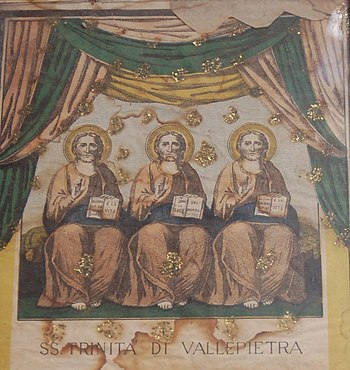 |
| cuadro que representa a la Trinidad (santuario della Santissima Trinità - Vallepietra RM) (Photo credit: Wikipedia) |
At first glance, most religions seem awfully complicated. The "sacred" texts, sometimes referred to as "Scripture" (almost always using unnecessary capitalization to convey an underserved status), can be quite dense. They are filled with the sort of inconsistencies one would expect from ancient writings cobbled together from many sources over several decades. Many religions have other writings besides the primary texts that are sometimes nearly as relevant too. Clergy study in schools devoted to their religion so they can learn more about its intricacies than most believers will ever comprehend. Some universities even have departments of theology or religious studies to provide advanced education in these complex systems. And yet, it seems that the bulk of this work serves to formulate and dispense palatable answers to the common objection that the core doctrine of the religion falls apart under scrutiny. That is, most of the study of religion seems to involve apologetics.
I suppose that is not accidental. Over time, those determined to advance their religion have discovered that they need answers to the many questions they will be asked. It does not matter much if the answers are good ones because people are going to want to believe them. Still, it helps if the answers are at least somewhat effective and reduce the questions.
I often wonder how hard would it be to boil down even a complicated religion to its core message. Take Christianity, for example, and ask yourself whether we could strip away the apologetics and unnecessary details to arrive at the essence. If we did so, I think it might look something like what follows. Of course, I also recognize that we will differ in the parts we choose to emphasize and those we leave out.
Act I
There is an all-powerful, all-knowing, and loving (but simultaneously jealous and wrathful) god that "exists" on a supernatural plane outside of time and space. This god created everything around us and remains deeply concerned with human affairs. We are the centerpiece of everything it created. We know of this god because it inspired several humans to write a book that tells us what it desires from us.
Act II
All humans are sinners. If you have ever done anything you shouldn't have (according to rules contained in the Christian bible), you are a sinner. Since we have all broken at least a couple of these rules, we're all sinners. Not only that, but sin is passed down so that you carry the burden of every bad thing your ancestors did. Sinners deserve punishment of the worst kind, and the god to which we referred above is eager to inflict them. This is a god that has previously killed almost all of humanity in fits of rage, so we'd better take it seriously. What this god has in mind is torturing your soul in the worst possible ways for eternity.
Act III
Fortunately, there is a way out. You can earn the forgiveness of this god and escape eternal punishment. You see, it loves you so much that it sacrificed its own son to provide you with salvation. This god sent its son to our world a couple thousand years ago (more recently than the ancient aliens were here) so that he could be brutally killed and then revived as a spirit to appear to a few people before returning to the supernatural world.
Act IV
The son's "good news" was that your sins will be forgiven and your spirit will live forever on a supernatural plane. All you have to do is believe in him. Of course, it is also a good idea to demonstrate the sincerity of your belief by loudly proclaiming it whenever you can and by attempting to get others to believe it too. If they resist, remind yourself that you are trying to do them a favor.
An early version of this post was written in 2007. It was revised and expanded in 2019.